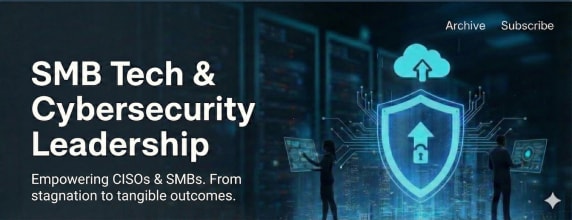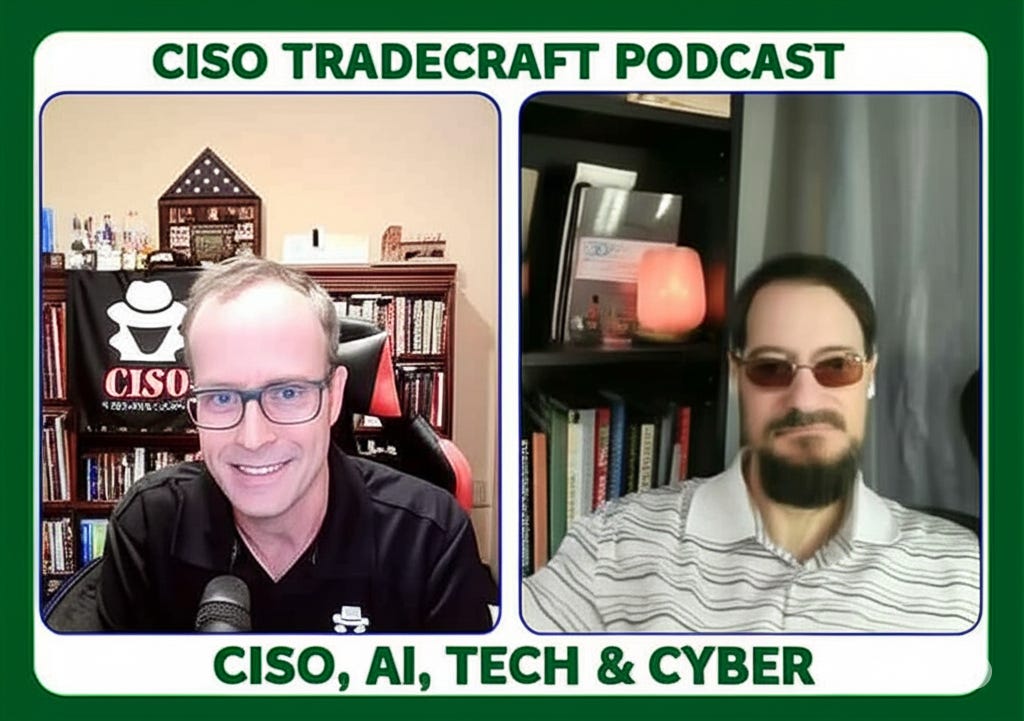CISO Trade Craft Podcast with Guest Christophe Foulon
From Help Dek to CISO: Insights with Christophe Foulon
I had the honor of being invited to be a guest on the show, and we will be sharing a joint episode.
Navigating the Path to Cybersecurity Leadership: Insights from CISO Tradecraft with Christophe Foulon
In this enlightening episode of CISO Tradecraft, host G Mark Hardy engages with cybersecurity expert and podcast host Christophe Foulon to explore the multifaceted journey into the field of cybersecurity. The discussion delves into leadership, career development, the challenges of being a Chief Information Security Officer (CISO), and the strategic considerations for those aspiring to excel in this dynamic field.
We highlight just some of the key topics below, but for the full story, listen to the podcast attached.
Breaking into Cybersecurity
Christophe Foulon shares his personal journey from the Caribbean to a successful career in cybersecurity, emphasizing the importance of passion and perseverance. Initially hesitant to pursue a computer science degree, Foulon instead focused on business, eventually transitioning from a help desk role into cybersecurity over seven years. This story underscores that breaking into cybersecurity can happen at any level, and it's not always a linear path.
The Allure and Responsibilities of a CISO
Christophe Foulon highlights the mystique surrounding the CISO role — an appeal often based on the title and salary. However, he cautions that aspiring CISOs should understand the demanding nature of the job, which includes long hours, incident responses, and carrying significant risk management responsibilities. It’s not a role for everyone, and those considering it should be prepared for a deeply involved and challenging career path. ###
Leadership and Career Development
For those on a cybersecurity career path, developing management and leadership skills is crucial. Hardy notes that technical prowess does not automatically translate into leadership or political skills. Navigating organizational politics, understanding business risks, and being able to advocate effectively at the board level are essential skills for CISOs. Foulon adds that personal motivation and the emotional rewards of the job should guide one's career decisions. Not everyone is suited for the political aspects of a C-level position, and that's okay. Organizations need diverse roles, from technical experts to strategic program developers.
The Winding Road to a Cyber Career
Think you need a computer science degree and a straight-line path to make it big in cybersecurity? Think again. Christophe’s own story is the perfect example of how passion and persistence trump a traditional background. He started his journey moving from the Caribbean, initially side-stepping a tech degree for business. His entry point? A help desk role.
It took him seven years to pivot from that help desk job into the cybersecurity world he was passionate about. The big takeaway here? Your starting line doesn't define your destination. It’s all about the drive to keep learning and moving forward, no matter where you begin.
The CISO Life: Is It Really for You?
Ah, the CISO role. It’s often seen as the top of the mountain—the big title, the corner office, the impressive salary. It has a certain allure, doesn't it?
But before you get starry-eyed, Christophe offers a reality check. Being a CISO isn't just about strategy meetings and a fancy title. It’s about being the ultimate backstop for risk. It means long hours, high-stakes incident response at 2 AM, and immense pressure. It's a demanding path that requires a specific kind of dedication. Are you truly ready for that kind of heat?
More Than Just Tech Skills
So you're a technical genius who can hack into anything (ethically, of course!). That’s amazing, but is it enough to lead? As G Mark Hardy pointed out, being a keyboard wizard doesn't automatically make you a boardroom diplomat.
To lead in cybersecurity, you have to develop your management and leadership muscles. Can you navigate office politics? Can you translate technical risk into business impact that the board understands? These are the skills that separate a great technician from a great leader. It’s less about the code and more about communication and influence.
Building Effective Teams.
In cybersecurity, having the right team is crucial. Christophe Foulon suggests that new leaders assess their teams to understand each member's motivations, passions, and areas for growth. Informal conversations and formal assessments can help place team members in roles where they can thrive, contributing to higher productivity and morale. Moreover, cybersecurity often attracts neurodiverse individuals whose unique perspectives and abilities can become superpowers when properly harnessed. Tailoring roles to fit individual strengths and interests can optimize team efficiency and satisfaction.
Navigating Static Defenses in Hiring Traditional
HR processes can sometimes hinder the recruitment of diverse and neurodiverse candidates in cybersecurity. Foulon advises leaders to engage with non-traditional recruiting avenues, such as niche conferences, to identify talent that might otherwise be overlooked in conventional hiring processes.
Your Team Is Your Superpower
When you step into a leadership role, your first job is to get to know your people. Who are they? What gets them excited to come to work every day? What are their hidden talents?
Think of it like being a coach. You wouldn't ask your star pitcher to play catcher, right? Christophe suggests having real, informal conversations to find out what makes each person tick. Cybersecurity is a magnet for neurodiverse talent, and sometimes, their unique ways of thinking are literal superpowers. By matching people to roles that ignite their passion, you build a team that’s not just productive, but happy and engaged.
Finding Hidden Talent
Let’s be honest: traditional HR hiring processes can be a bit… rigid. They often use filters that accidentally screen out incredible, non-traditional candidates. That brilliant, self-taught analyst who doesn't have a specific certification might never even get past the automated keyword scanner.
So, what's a leader to do? You have to get creative. Christophe advises leaders to break free from the usual hiring paths. Go to niche conferences, participate in online communities, and connect with people in spaces where raw talent shines, even if their resumes don't tick every single box.
Transitioning to Fractional or Virtual CISO Roles
For seasoned professionals looking to transition into a virtual or fractional CISO role, Foulon advises focusing on personal passions that recharge one's emotional batteries. It's essential to clearly define the scope of services, risk ownership, and legal responsibilities when engaging with clients. Additionally, securing appropriate indemnity and cyber insurance is crucial to manage unforeseen liabilities.
Going Solo: The Virtual CISO Path
Ready to be your own boss? For seasoned pros, becoming a fractional or virtual CISO (vCISO) can be a fantastic next step. But it comes with its own set of challenges. Christophe’s advice is to find a personal passion that recharges your batteries, because you’re going to need it.
When you go fractional, you're running a business. It’s critical to clearly define what you do (and don't do), who officially owns the risk, and what your legal responsibilities are. And please, don't forget the boring—but-crucial stuff: get your contracts and insurance in order. You need to protect yourself just as much as you protect your clients.
Conclusion
The conversation with Christophe Foulon on CISO Tradecraft offers invaluable insights into navigating the cybersecurity field. Whether you're just starting, aiming for a CISO role, or considering a virtual CISO position, the key is to align your career with your passions, continuously learn, and strategically manage both personal and organizational risks. For more insights, you can find Christophe Foulon's podcast "Breaking into Cybersecurity" on Apple Podcasts, Spotify, and YouTube. His books are available on Amazon. For further information, visit his website at christophefoulon.com. Stay safe out there, and remember to mentor and support others along their cybersecurity journey — it’s one of the most rewarding aspects of being a leader in this field.
So, what’s the bottom line after this deep dive with Christophe Foulon? The path through cybersecurity is deeply personal. Whether you're just starting out, aiming for that CISO chair, or thinking of going solo, your career should be guided by your passion. The key is to never stop learning, understand what truly motivates you, and always think strategically about risk—both for your company and for yourself. And hey, while you're climbing that ladder, don't forget to reach back and help pull someone else up behind you. That's what real leadership is all about.
For more fantastic insights, check out Christophe Foulon's podcast "Breaking into Cybersecurity" and find his books on Amazon. You can connect with him directly at his website, christophefoulon.com.
Frequently Asked Questions (FAQs)
1. I don't have a tech background. What's the best first step to get into cybersecurity?
A great starting point is to build foundational IT knowledge. Consider entry-level certifications like CompTIA A+ or Network+ to understand how computers and networks operate. From there, you can explore security-specific certs like Security+. Just as importantly, immerse yourself in the community through podcasts, blogs, and online forums to learn the language and culture of the industry.
2. What's the one non-technical skill that aspiring CISOs should focus on developing?
Business acumen. The most effective CISOs are those who can speak the language of the business. You need to understand how the company makes money, what its strategic goals are, and how cybersecurity risk translates into business risk. This allows you to have meaningful conversations with other executives and the board.
3. How can I find a mentor in the cybersecurity field?
Don't be afraid to reach out! LinkedIn is a great tool for finding professionals whose careers you admire. Engage with their content thoughtfully before sending a connection request. Also, attend local or virtual industry meetups (like BSides events) and conferences. The cybersecurity community is generally very supportive and open to mentoring newcomers.
4. Is a virtual CISO role less stressful than a full-time CISO role?
Not necessarily—the stress is just different. As a vCISO, you may have more control over your schedule, but you're also juggling multiple clients, each with their own unique problems and culture. You're also responsible for running your own business, which includes sales, marketing, and legalities. It trades the stress of corporate politics for the stress of entrepreneurship.
5. As a manager, how do I start a conversation with my team about their passions without it feeling like a formal review?
Keep it casual. Instead of scheduling a formal meeting, bring it up during a one-on-one coffee chat or at the end of a regular check-in. Ask open-ended questions like, "What's the most interesting project you've worked on recently?" or "If you could learn any new skill right now, what would it be?" The goal is to show genuine curiosity about them as a person, not just as an employee.



